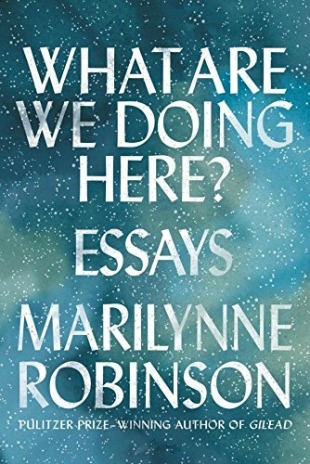In a Nutshell: Marilynne Robinson's bold and thought-provoking collection of essays challenges us to go deeper as she probes worn-down ideas about capitalism, slavery, the Puritans, American exceptionalism, and the U.S.'s wobbly two-party political system. This sturdy volume gathers together lectures given in churches, seminaries, and universities over the last few years. Robinson winces at the widespread capacity of citizens to indulge in ideological thinking at the expense of compassionate faith.
About the Author: Marilynne Robinson is the author of the novels Lila, Home, Gilead (winner of the Pulitzer Prize), and Housekeeping, and five books of nonfiction: The Givenness of Things, When I Was a Child I Read Books, Mother Country, The Death of Adam, and Absence of Mind. She lives in Iowa.
Sum and Substance: There is a prophetic edge to Robinson's complex and substantive essays on the current scene in America. She laments the cynicism of Progressives and the self-interest of the Right. She hopes that religious people and scientists will set aside their strife and work together affirming both evolution and faith. She is saddened by the limited purviews of Marx and Darwin. Two of Robinson's heroes are the Puritan preacher and philosopher Jonathan Edwards and former President Barack Obama. In her multidimensional coverage of political consciousness, the author praises the works of Ralph Waldo Emerson and Alexis de Tocqueville as great thinkers who have much to say to our present-day situation.
Quotes to Go:
Counterintuitive Christianity: "Christianity is profoundly counterintuitive — 'Love thy neighbor as thyself' — which I think properly understood means your neighbor is as worthy of love as you are, not that you're actually going to be capable of this sort of superhuman feat. But you're supposed to run against the grain. It's supposed to be difficult. It's supposed to be a challenge."
Rapacious Capitalism: "I have heard, more times than I can count, that capitalism was an American invention, and the basis of our 'exceptionalism.' . . . This nonsense is important first of all because it legitimizes rapacious capitalism as preeminently American, the source of our success, including those freedoms we acknowledge. And it describes a national character formed around the values associated with it, a generalization that has important interpretive consequences — everything that has happened in our history is to be understood in its essence as profit driven."
Those Who Lived Before Us: "Great pity and very great respect are owed to all those generations who lived and died before us, not least because they, through war and plague and famine, conferred a precious heritage on us of art, language, music and thought. And they conferred as well a tremendous burden of festering hostilities, vicious inequalities, and outright crimes that we have no great success in understanding or meliorating, that we have in fact compounded."
Astonishing Creatures: "Let us face the truth, that human beings are astonishing creatures, each life so singular in its composition and so deeply akin to others that they are inexhaustibly the subject of every art. A tremendous freedom always lies behind prejudice and begins to be released the moment the errors that are the substance of prejudice are acknowledged as error. Our present world does not need to be offered cynicism as ultimate truth. it does not need new grounds for indifference to human life or contempt for the norms that ciscourage exploration and violence."
